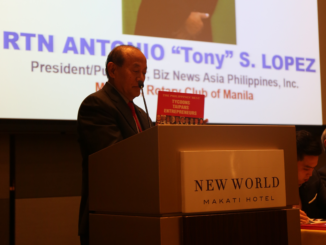
In October 2017, BizNewsAsia weekly business magazine predicted that Edgar “Injap” Sia II’s DoubleDragon Properties Corp. would be the Philippines’ next corporate giant.
This business weekly anchored its prediction on DD’s track record. In 2017, it became the Philippines’ fastest growing property company – in revenues, profits, and acquisitions.
In 2014, when DD went public the P1,000 invested in the company ballooned 15-fold to P15,000, by Injap’s own reckoning. A 1,400% increase in share price, from P2 a share to P30, in four years, is equivalent to a 350% per year average gain in share price. Not bad for a company that in 2017 was barely seven years old.
 DD’s market capitalization, or its stock market value, was, for a while, higher than its much larger and older rivals.
DD’s market capitalization, or its stock market value, was, for a while, higher than its much larger and older rivals.
In March 2017, with a market cap of P120.6 billion, DD was more valuable than Robinsons Land (P94.9 billion), and Megaworld (P109.29 billion).
In the past three years, DD’s revenues have risen on the average, by 61% per year, to P6.61 billion in 2017. Profits have surged, by 73% yearly average, to P2.52 billion in 2017. By 2016, Injap had become the Philippines’ youngest dollar billionaire, with networth of $1 billion.
However, following a recent correction in DD’s share price, Injap’s 37% in DD is now worth only $475 million, a 46.6% decline. The belated, if not much needed share price drop after a frenetic and fantastic rise, while seemingly precipitous, is the potential upside for DD’s investors. In stock market parlance, it is a “correction”, creating a momentum for a sudden surge.
This April, DD is raising P7.5 billion in equity funding by selling 135 million new common shares. The P7.5 billion proceeds from the IPO will fund 1) the expansion of its leasing and hotel business; leasable space has been increased 20% from one million square meters to 1.2 million by 2020; and 2) land acquisitions for future growth. In the past four years, DD raised P40 billion in funding for its projects.
This year, with the peso cheap because of the rising dollar, foreign investors are ex- pected to overwhelm local investors in bid- ding for DD’s new common shares. Foreign players were left out during the 2014 IPO, they having underestimated DD’s market potential. DD has recently repurposed its business model. Its two main businesses will now be leasing and hotels.
Leasing will be of three kinds – retail space, office space, and industrial factory, warehousing and logistics space. With the Philippines now the fastest-growing economy in Asia, outside China, and the Filipino now veritably middle class, all three sectors are booming. “The leasing business has a very high profit margin,” notes Injap Sia, chair and CEO of DoubleDragon Properties Corp.
Compared with selling real estate, leasing has good returns, plus the upside of asset value appreciation.
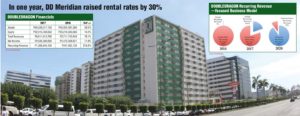 DD’s retail space leasing has one remarkable push factor. Filipino consumers in big cities and urban areas like Metro Manila and Cebu may be getting tired of visiting big or massive malls, huge mountains of concrete and sprawling car parks that can be oppressive and unmanageable with horrendous traffic and hordes of shoppers. What do these shoppers do instead? Instead of visiting brick and mortar shops in malls, they go wireless, cashless, and carless. They go online or mobile with their cellular phones to shop. “Shoppers will still visit big malls,” notes Injap, “but not to shop.”
DD’s retail space leasing has one remarkable push factor. Filipino consumers in big cities and urban areas like Metro Manila and Cebu may be getting tired of visiting big or massive malls, huge mountains of concrete and sprawling car parks that can be oppressive and unmanageable with horrendous traffic and hordes of shoppers. What do these shoppers do instead? Instead of visiting brick and mortar shops in malls, they go wireless, cashless, and carless. They go online or mobile with their cellular phones to shop. “Shoppers will still visit big malls,” notes Injap, “but not to shop.”
Consider this: Only one of every 20 Filipinos has a credit card, a 5% penetration rate. But four out of every 10 Filipinos have a Facebook account, a 40% penetration rate. What do you do then? Shop with your mobile phone, or Facebook. People now buy and sell online. It’s called e-Commerce. And companies like Amazon and Alibaba have joined into the bandwagon to become behemoths of retailing.
What does Injap do then? His DD will concentrate on what he calls Tier 2 to Tier 3 communities – cities and communities outside the big metropolises, small yet big enough for a retailer to have scale.
A Tier 1 City generally has one million and up population like Metro Manila, Cebu, and Davao.
A Tier 2 City has about 300,000-600,000 population like Iloilo, Cagayan de Oro, Naga, and Dagupan.
A Tier 3 City has 100,000-250,000 population like Roxas City, Koronadal City, Kidapawan City, Ozamiz City, Cadiz City, Kabankalan City, Dumaguete City, Tagbilaran, City, and Sorsogon City.
“We have more than 100 Tier 3 cities in the Philippines. That’s where we focus on building CityMalls. And that is the market that will become the turf of CityMalls,” says Sia.
DD’s CityMalls are designed and customized precisely to meet that market segment Injap is building 100 CityMalls by 2020. So far, this 2018 alone, he has started up 28 malls and is completing another 22 to reach his target of 50 malls by yearend. He will build 25 CityMalls in 2019, and 25 more in 2020 to reach his century target. CityMalls have 95.3% of space leased out, meaning, there is little, if any more, space to rent out.
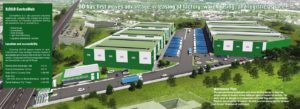 DD’s entry into leasing of factory, warehouse, and logistics space is also in reaction to the rise of e-Commerce. “You need warehouse space and logistics operation to deliver the goods bought online,” explains Injap. DD already is building eight CentralHubs with total leasable space of 100,000. Two hubs, in Tarlac and Iloilo, will have 54,000 sqm of leasable industrial space.
DD’s entry into leasing of factory, warehouse, and logistics space is also in reaction to the rise of e-Commerce. “You need warehouse space and logistics operation to deliver the goods bought online,” explains Injap. DD already is building eight CentralHubs with total leasable space of 100,000. Two hubs, in Tarlac and Iloilo, will have 54,000 sqm of leasable industrial space.
At the same time, DD promises to be one of the country’s biggest hotel operators with as many as 5,000 hotel rooms by 2020. With 844 rooms, hotel occupancy averaged 74.8% in 2017.
DD began originally as Injap Land Corp. of Injap Sia on Dec. 9, 2009 engaged primarily in real estate development. In November 2010, it began commercial operations.
In June 2012, ILC changed its name to DoubleDragon Properties Corp. as it became a joint venture between Injap and the family of Tony Tan Caktiong of Jollibee Foods Corp., who owns 37%, thru the
fastfood king’s Honeystar Holdings Corp.. The remaining 26% is owned by the public.
Emerging giant
DoubleDragon Properties Corp. is one of the Philippines’ fast-rising and growing emerging real estate companies. It is principally engaged in the ownership and operation of a portfolio of leasable properties through its four principal business segments: retail leasing, office leasing, hospitality and industrial leasing, with the aim of becoming one of the leading property players in the Philippines with the highest percentage of recurring revenue.
DoubleDragon’s two principal shareholders are Injap Investments Inc., controlled by the Sia family of Edgar “Injap” Sia, and Honeystar Holdings Corp. controlled by the Tan and Ang families, who also controls Jollibee Foods Corp. (JFC), the largest fast food company in the Philippines.
As of Dec. 31, 2017, through its subsidiary, CityMall Commercial Centers Inc. (CMCCI), DoubleDragon owns and operates 25 CityMalls, with a total leasable area of 147,806.0 sq. m., primarily located in the provincial areas of the Philippines.
As of April 2018 CityMall already had 28 operational malls.
DoubleDragon also has 21 CityMalls under construction, with an additional land bank for 17 CityMalls.
CMCCI is 66% owned by DoubleDragon and 34% owned by SM Investments Corp. (SMIC), the holding company for one of the largest conglomerates in the Philippines.
Office leasing
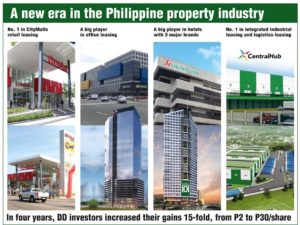 DoubleDragon’s office leasing segment primarily consists of two key projects under development, DD Meridian Park and Jollibee Tower. DD Meridian Park, a 4.8 hectare projected located in the Manila Bay area of Pasay City, and which is 70%-owned by DoubleDragon.
DoubleDragon’s office leasing segment primarily consists of two key projects under development, DD Meridian Park and Jollibee Tower. DD Meridian Park, a 4.8 hectare projected located in the Manila Bay area of Pasay City, and which is 70%-owned by DoubleDragon.
DD Meridian Park is expected to consist of 280,000 sq. m. of leasable space. Meridian space will primarily be used for BPO, outsourcing and support service offices, and corporate offices and is to be constructed in four phases, with the first phase expected to be completed in the first quarter of 2018, and the second phase expected to be completed in the fourth quarter of 2018.
Jollibee Tower is a Grade-A 41-storey commercial and office tower with 47,909 sq. m. of leasable space. It is situated in the heart of the Ortigas central business district in Metro Manila.
Jollibee Tower project is expected to be completed in 2018. It is a joint venture between DoubleDragon and JFC, who will serve as the building’s anchor tenant.
Hotel business
DoubleDragon’s hospitality segment is operated through DD’s subsidiary, Hotel of Asia, Inc. (HOA), which is 70%- owned by DoubleDragon, and HOA’s wholly owned subsidiary, Hotel 101 Management Inc.
The hotel business has 866 operating hotel rooms, including DoubleDragon’s own hotel brand, “Hotel 101”, which currently has one operating hotel in the Bay Area near the Mall of Asia.
CSI Hotels, Inc., a 50%-owned subsidiary of HOA, is the Philippines’ master franchisee of the “Jinjiang Inn” brand, with two hotels in operation in Ortigas and Makati, Metro Manila primarily targeted at Chinese tourists.
Hotel 101 Management Corp., a wholly owned subsidiary of HOA, operates Injap Tower, a 21-storey condotel located in Iloilo City. As of Dec. 31, 2017, DoubleDragon had one hotel under construction, Hotel 101 Fort.
Five more hotels are in the planning and development stage. They are: Hotel 101 Bohol, Hotel 101 Davao, Hotel 101 Boracay, Jinjiang Inn Boracay (Newcoast) and Jinjiang Inn Cagayan de Oro.
DD recently announced the entry by HOA into a joint venture for the development of Hotel 101 Resort-Boracay in Megaworld’s Boracay Newcoast estate. DD aims to have 5,000 rooms under management by 2020 and also intends to subfranchise its “Jinjiang Inn” brand in the future.
Industrial leasing
DD’s latest venture into the growing industrial leasing segment is through its wholly owned subsidiary, CentralHub Industrial Centers Inc. (CHICI).
DoubleDragon, through CHICI, acquired a 6.2-hectare parcel of land in Luisita Industrial Park, Tarlac and a 3.9-hectare parcel of land in Iloilo for industrial leasing, and DoubleDragon intends to acquire six additional sites strategically located across Luzon, Visayas and Mindanao.
For the years ended Dec. 31, 2015, 2016 and 2017, DD had total revenues of P1,929 million, P3,711.8 million and P6,611.9 million ($132.4 million), respectively.
DoubleDragon also had net income of P622.8 million, P1,470.3 million and P2,526.3 million ($50.6 million), respectively, over the same periods. DD’s recurring revenue, comprised of its rental income and income from hotel operations, was 6%, 9.4% and 19.8% of its total revenues for the years ended Dec. 31, 2015, 2016 and 2017, respectively.
Competitive strengths
DD is fast growing real estate property group. Its business will be supported by a diversified recurring income platform from four property pillars retail, office, hospitality and industrial segments
DoubleDragon is predominantly a developer and owner of a portfolio of investment properties with a total leasable area of 191,106.5 sq. m. as of Dec. 31, 2017.
It continues to grow faster by widening its presence and deepening its penetration across the Philippines. It plans to increase its portfolio’s leasable area to 1.2 million sq. m., spanning across the retail, office, hospitality and industrial segments by 2020.
DD’s business model is to derive a significant majority of its revenues from recurring income streams.
For the year ended Dec. 31, 2017, 19.8% of its total revenue was contributed by the retail and hospitality business segments.
As of Dec. 31, 2017, DoubleDragon had 25 operational CityMalls with a total leasable area of approximately 147,806.0 sq. m. and occupancy of 95.3%. As of Dec. 31, 2017, 21 CityMalls are under construction, and DD has additional land bank for 17 new CityMalls. DD intends to establish a nationwide presence of 100 CityMalls with a total leasable area of 700,000 sq. m. by 2020.
All CityMall sites are in prime locations within the natural daily movement of the general population that the DD serves. CityMall sites are secured in areas located along main roads to increase visibility and maximize exposure and accessibility to its target market.
Organic growth
DoubleDragon believes that there remains significant organic growth within its CityMalls business model.
Same store sales growth for FoodWorld which is comprised of brands owned by Jollibee Foods Corp., in the first five operational CityMalls which were completed in 2015 was a robust 12.3% in 2017 over 2016.
Growth was underpinned by positive market reversions and fixed annual escalation ranging from 5% to 10%.
Moreover, there is potential for further upside with the transition to a turnover rent structure (based on sales) from the base rent structure, as its business scales up and its tenants’ retail sales continue to increase.
DD Meridian Park
DD Meridian Park is an office-led mixed-use development with leasable area of 280,000 sq. m. DoubleDragon Plaza, which comprises phase 1 of the DD Meridian Park project, opened in December 2017 and is expected to be completed in the first quarter of 2018.
DoubleDragon Center East and DoubleDragon Center West, which comprise phase 2 of the DD Meridian Park project, was 23.3% complete as of Dec. 31, 2017.
Further, as of Dec. 31, 2017, towers one, two, three and four of DoubleDragon Plaza are 89.8%, 100%, 100% and 100% pre-committed, while the retail area of DoubleDragon Plaza is 61.7% pre-committed.
Ortigas project
Complementing DD Meridian Park is Jollibee Tower, a premium-grade office building which will be the future headquarters of JFC. As of Dec. 31, 2017, the building was 14.2% completed and 30% pre-committed. It will be completed by the fourth quarter of 2018.
DD has 3 hotel chains
Through DoubleDragon’s three star hotel chains – Hotel 101, Jinjiang Inn and Injap Tower – under DoubleDragon’s subsidiary, HOA, DoubleDragon expects to benefit from the strong growth of the Philippine economy and the expected healthy tourism sector performance.
Jinjiang Inn
CSI Hotels, Inc., a 50% subsidiary of HOA, is the exclusive master franchisee of the Chinese hotel chain Jinjiang Inn in the country – awarded the Best Local Hotel Brand in 2016 / 2017 by City Traveler.
With Jinjiang Inn’s strong mainland China customer base and familiarity with the brand, DoubleDragon is well positioned to benefit from the growing inbound Chinese tourists which was expected to increase to one million in 2017, according to Savills.
According to the Department of Tourism, there were 675,700 arrivals from China in 2016, making China the third largest source of foreign tourists in the Philippines. In 2017, the Chinese overtook the Americans as the Philippines’ No. 1 tourists.
All the hotels under both brands are strategically located in areas which are in close proximity to one or all of the following: business hubs, shopping malls, and dining options.
As of Dec. 31, 2017, Hotel 101 Manila, Jinjiang Inn Ortigas, Jinjiang Inn Makati and Injap Tower had 518, 95, 59 and 194 rooms, respectively. The target is a hotel portfolio of 5,000 rooms with a leasable area of 100,000 sq. m. by 2020, offering investors the opportunity to gain exposure to what could one the largest hotel portfolios in the Philippines in room count.
Industrial leasing
In addition, DoubleDragon formed its wholly owned subsidiary CentralHub Industrial Centers Inc. (CHICI) as its industrial leasing arm. DoubleDragon envisions CHICI to be a branded modern institutional quality logistics facility suited for commissaries, cold storage and logistic centers.
DoubleDragon has secured a 6.2-hectare site in Tarlac and a 3.9 hectare lot in Iloilo, as part of its plan to build eight industrial centers by 2020 (two in North Luzon, two in South Luzon, two in Visayas and two in Mindanao), adding 100,000 sq. m. to its leasing portfolio.
DoubleDragon believes that its recurring income stream is anchored on a portfolio of quality assets that will likely appreciate in value given their location. DoubleDragon believes that these assets, collectively, will generate strong cash flows and a well-capitalized balance sheet.
Well-defined execution capability with proven track record of delivering growth
Leveraging its end-to-end capabilities as a real estate developer and owner, encompassing site identification, master planning, development, marketing, leasing, events, client relationship management, data analytics, DoubleDragon believes that it has the ability and resources to create a market leading business model.
- Standard project blueprint enables a highly cost efficient rapid roll-out strategy across its business segments.
DoubleDragon remains focused on growing its business segments to achieve economies of scale and drive cost efficiencies. For example, with its aim to be the largest community mall player in first class municipalities and second and third class cities, the rollout of its expansion plans allows DoubleDragon to achieve operational efficiencies as it has the optionality to offer multiple CityMall construction projects to the contractors within the same province.
As a result of repeated transactions with the local contractors, not only does DoubleDragon have direct interaction with workers who have better on-the-ground experience in sourcing labor and local materials, DoubleDragon believes that it gains familiarity with the execution process to ensure that its development timelines are met.
Similar to CityMalls, DoubleDragon plans to scale up significantly to dominate and be the largest player in the Philippines hospitality and industrial segments to benefit from economies of scale.
To ensure rapid roll-out to achieve economies of scale, DoubleDragon has developed and adopted a standardized approach to the development and marketing of its business segments. For example, the timeline for the start of development to stabilized operations for each of its CityMalls is approximately 18 months (construction permit to opening of 12 months and a further six months to stabilize), which has enabled DoubleDragon to deliver new malls to the fast and hardly any delay.
As of Dec. 31, 2017 there were 25 operational malls; 28 by today. Similarly, DoubleDragon is adopting a standardized approach in developing its hotels and industrial leasing businesses to shorten the development-to-cash generating cycle.
- Proven execution ability in delivery.
DoubleDragon believes that it has an established execution track record. Just over three years since listing, DoubleDragon has managed to build up an investment property portfolio with a leasable area of 191,106.5 sq. m. as of Dec. 31, 2017, representing 19.1% of DoubleDragon’s initial planned 1.0 million sq. m. of leasable space. Given the pace of DoubleDragon’s growth and success in sourcing and securing new sites, DoubleDragon has increased its leasable area target to 1.2 million sq. m. by 2020.
As of Dec. 31, 2017, DoubleDragon secured 77% of its land bank needs for its enhanced 2020 plan of 1.2 million sq. m. leasable area.
DoubleDragon’s confidence in raising its target is also due to its standardized and scalable operational model, which enables it to establish a track record of timely delivery of its projects.
In addition, DoubleDragon has also displayed a track record of delivering high committed occupancies for its investment properties:
Average committed occupancy for its 25 operational CityMalls as of Dec. 31, 2017, is approximately 90% at opening; and 96% as of Dec. 31, 2017, towers one, two, three and four of DoubleDragon Plaza are 89.8%, 100%, 100% and 100% pre-committed, while the retail area of DoubleDragon Plaza is 61.7% pre-committed, and Jollibee Tower is 30% pre-committed.
- Strategic acquisitions to enter into new business segments.
In line with a revised target leasable portfolio from 1.0 million sq. m. to 1.2 million sq. m. by 2020, DoubleDragon has already made swift and strategic acquisitions to enter into the hospitality and industrial leasing businesses.
In October 2016, DoubleDragon acquired 70% of HOA, an existing hotel business contributing approximately 19,064.5 sq. m. to the leasable portfolio as of Dec. 31, 2017, with plans to expand HOA to eventually contribute 100,000 sq. m. of leasable space through the operation of 5,000 rooms by 2020.
In August 2017, DoubleDragon announced its acquisition of a 6.2 hectare industrial lot expected to contribute approximately 32,000 sq. m. of industrial leasing area, with a target to acquire more sites to eventually contribute 100,000 sq. m. towards DoubleDragon’s leasable portfolio by 2020.
Recently, DoubleDragon announced its new joint venture to develop Hotel 101 Resort-Boracay on Megaworld’s Boracay Newcoast development, and its acquisition of a 3.9 hectare industrial lot in Iloilo for its second CentralHub site.
- Proven ability to raise funding.
DoubleDragon has demonstrated a strong ability to secure funding, raising approximately P40 billion in capital in the last four years. Majority of the money was used to ensure that DoubleDragon’s initial target plan of 1.0 million sq. m. of leasable area was fully funded.
DoubleDragon has also diversified its sources of funds to include bank borrowings, and issuance of preferred shares and fixed-rate corporate bonds.
These enhance DoubleDragon’s financial flexibility in raising capital. Importantly, this has allowed DoubleDragon to react faster to growth and any potential inorganic opportunities that is value accretive for its business, such as the acquisition of HOA and CHICI.
Leading community mall business model in first class municipalities and second and third class cities
DoubleDragon has become the dominant player in the modern format branded community mall segment across Philippines. As of Dec. 31, 2017, DoubleDragon has secured 63 CityMall sites.
38% market share in malls
Per Savills’ estimates, DoubleDragon is expected to hold approximately 37.9% of the community mall stock in first class municipalities and second and third class cities by 2020.
DoubleDragon believes that it is one of the first movers at the forefront of retail modernization in first class municipalities and second and third class cities, and has created a business model that is positioned to significantly benefit from the transition from traditional retail to modern retail, attributed to high barriers of entry for foreign players and varying strategic focus of local players.
Foreign players face issues including the following:
(i) constitutional restrictions, which limit foreign ownership to not more than 40% for companies that own land and retail businesses, among others, and
(ii) a lack of local relationships, existing local network and knowledge, preventing them from gaining access to land bank and expanding on a similar scale.
Based on Savills’ research, there is little competition from foreign developers present in the market. Other domestic entrants in the community malls segment include Waltermart Superkmarket, Inc., Gaisano Grand Group, Gaisano Capital, Robinsons and Vista Land, but the pace of their expansion and existing network across first class municipalities and second and third class cities has not been as extensive as CityMall’s.
In addition, most of these companies’ business models focus on supermarkets, unlike a typical CityMall which seeks to offer the all-in-one modern shopping retail format (e.g. cinema, shopping, food and beverage, and grocery shopping). Even for the larger local players, the focus remains on Metro Manila and bigger cities.
Well-positioned to benefit from positive macroeconomic fundamentals, political tailwinds and emerging opportunities within the industry sectors
Strong economy
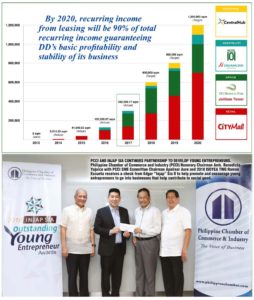 The Philippines’s positive macroeconomic fundamentals support its strong growth story trajectory. Philippine 2016 GDP growth of 6.9% was the highest witnessed in the last three years, and its 2017 GDP growth of 6.7%, continued to exhibit strength.
The Philippines’s positive macroeconomic fundamentals support its strong growth story trajectory. Philippine 2016 GDP growth of 6.9% was the highest witnessed in the last three years, and its 2017 GDP growth of 6.7%, continued to exhibit strength.
According to Savills, the Philippines is expected to have one of the strongest real GDP growth rates forecast for 2018 in ASEAN with a GDP growth rate of approximately 6.8%. The Philippines continues to be one of the largest economy in the region, after Indonesia and Thailand.
The Philippine retail market is evolving from unorganized retail formats to multi-tenanted malls, the latter providing a compelling alternative to traditional retail pathways such as wet markets and provision shops, and introducing the modern shopping experience to the local communities.
Evolving retail market
The Philippine economy has been expanding by greater than 6% per annum for the last five years based on publicly available data from the Philippine Statistics Authority. The robust growth reflects not just the sustained dynamism of the BPO-led services sector but also the expansion of other key economic sub-sectors such as construction, telecommunications, banking and finance, warehousing and logistics, and manufacturing.
According to Savills, the modern retail format is attractive to customers as this provides them a one-stop platform for both discretionary and non- discretionary consumption. In particular, the presence of a clean, air-conditioned indoor one-stop mall in first class municipalities and second and third class cities is expected to be highly attractive to the cities’ population.
Savills also believes that this is also attractive to tenants given significantly higher footfall and sales per sq. m. achieved compared to unorganized retail, and this format provides quality control with guaranteed infrastructure and logistics that helps to build brand equity.
DoubleDragon believes this trend is only starting to occur in first class municipalities and second and third class cities, and DD’s entry into these markets is well-timed to take advantage of this shift.
Duterte strategy
President Duterte’s administration plans to refocus development towards the agriculture, manufacturing and trade industries in the countryside and disperse economic opportunity across all socioeconomic levels.
In addition, initiatives are being put in place to minimize red tape and streamline regulatory procedures in order to accelerate development.
This could accelerate economic growth in first class municipalities and second and third class cities, increasing populations as more businesses entering such areas, and potentially prompting increased demand for retail space in such areas given stronger expected foot traffic amid new population migrating for jobs, and increased disposable income.
According to Savills, the current political thrust to decentralize economic growth is also expected to benefit DoubleDragon’s CityMalls in first class municipalities and second and third class cities.
Why the demand for office space
Companies engaged in these businesses engaged in construction, telco, banking, warehousing and logistics, and manufacturing are compelled to expand and thus occupy larger and high-quality office space.
Demand for office real estate is also expected to benefit from the growing trend of offshore gaming in the Philippines given similar space and infrastructure requirements as BPO offices.
The Philippine Amusement and Gaming Corp. (PAGCOR) has been granting recently established POGO licenses for foreign nationals, as revenues from online gaming is expected to eventually match revenues from traditional casinos.
Tourism outlook
According to Philippine News Agency, the Philippine Department of Tourism recorded 6.62 million foreign tourists arrivals in 2017, 10.96% higher than the 5.97 million recorded in 2016.
The Philippine tourism growth is expected to be sustained by the influx of visitors from the country’s traditional markets such as South Korea, USA, Japan, and China.
The four economies account for nearly 60% of annual tourist arrivals in the country. Warming relations between the Chinese and Philippine governments should also result in more Chinese tourists.
In late 2016, the Philippine and Chinese governments signed an agreement on tourism cooperation that includes exploring a possible increase in capacity entitlements in air services and encouraging airlines to open new flights between Philippine cities in the Visayas and Mindanao regions and Chinese cities.
Tourism sector should also benefit from the spillover impact of the successful hosting of major international events in the past two years such as APEC Summit, ASEAN Tourism Forum, Routes Asia, and Miss Universe.
With rising international arrivals and sustained rise in visitor receipts (P230 billion in 2016 from P227.6 billion in 2015), hotel occupancy in Metro Manila increased by two-percentage points from 69% in the first half of 2016 to 71% by end-2016.
There are also major tourism-related infrastructure projects under the public-private partnership (PPP) program.
For example, the government is working on a comprehensive international airport development plan that covers the expansion and privatization of Ninoy Aquino International Airport (NAIA); development of another international airport in Bulacan or Sangley Point, Cavite; and expansion of Clark airport.
This is expected to bridge the country’s infrastructure gaps and enable the government to meet or even surpass its visitor arrival target and entice more foreign and local businessmen to invest in the country’s travel and tourism sector.
Logistics demand
The Philippines’ favorable macroeconomic dynamics is expected to translate into strong and sustainable demand for logistics facilities underpinned by limited stock of logistics facilities, in particular modern logistics facilities in the Philippines. Strong real GDP growth, private consumption, as well as a large and rapidly growing middle-income population is expected to boost the Philippine consumer market.
Notably, most of DoubleDragon’s current CityMall tenants are heavy users of logistics space. However, a majority of the current stock of logistics warehouses is old generation properties and fragmented, which provide less efficient warehousing conditions.
In contrast, modern logistics warehouses carry features such as large floor areas, high ceilings of 14 meters high, high load tolerances, wide column spacing within the warehousing area, modern loading docks and enhanced safety systems which provide greater accessibility and efficiency.



